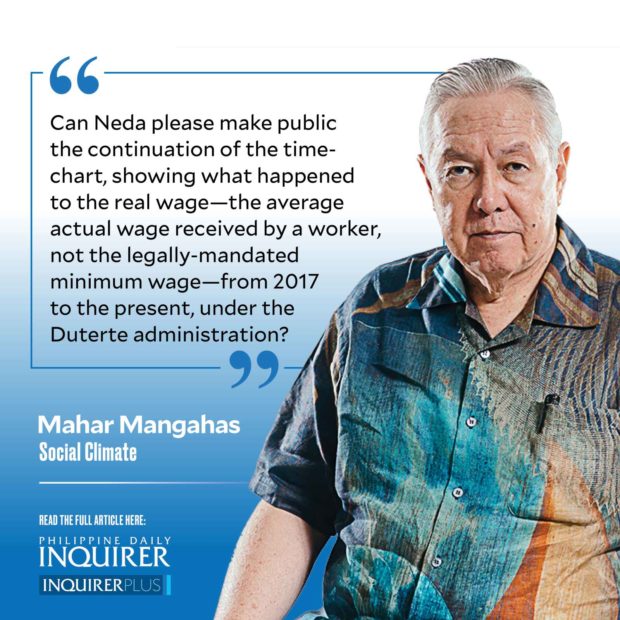Social statistics gone missing
Social statistics on topics that really matter do not grow in the wild, like colorful flowers to be plucked off for decoration. They are more like fruit from selected trees planted and nurtured in an orchard, harvested at due times, and properly prepared for consumption.
No exit poll this time. Because no media sponsor came forward, unlike in 2016 and earlier elections, for the first time SWS has no exit poll data on the sex, age, education, religion, and other particulars of those who voted in the May 2022 election (see my “Air, ground, and cyber war,” 5/14/2022). The Commission on Elections does not collect such data; its details are purely geographical. (If any research entity did an exit poll, let it come forward.)
Still no release of government data about actual wages. In early 2018, Karl Kendrick Chua—at that time undersecretary of finance, and later director-general of the National Economic and Development Authority (Neda)—gave a public talk titled “Real labor productivity has been increasing, yet real wages have been stagnant” (see my “Stagnation of real wages,” 3/3/2018).
Mr. Chua’s presentation included a time-chart of real-wages, presumably sourced from the government’s Labor Force Survey (LFS). It showed that the real wage, i.e., as adjusted for inflation, did not grow at all from 2001 to 2016, even though real labor productivity grew by at least 50 percent. That was a poor showing of the Macapagal-Arroyo and Aquino III administrations; it confirmed my personal feeling that data on wages existed but were just too embarrassing to be revealed.
Well, can Neda please make public the continuation of the time-chart, showing what happened to the real wage—the average actual wage received by a worker, not the legally-mandated minimum wage—from 2017 to the present, under the Duterte administration?
The annual rate of inflation in the cost of living has been rising, and will reportedly hit 5 percent this year; are there corresponding increases in actual wages to compensate for it? Or has income from work ceased to be reported in the LFS?
The non-responsiveness of the real wage to growth in gross domestic product (GDP) per worker is yet more evidence that there is no trickle-down effect. This makes GDP useless as an indicator of the economic progress of the people (see my “Watch poverty, not economic growth,” 5/21/2022).
No resumption of SWS surveys on corruption. Social Weather Stations did a foundation-funded series of 13 surveys of top executives of Filipino enterprises on the subject of government corruption, from 2000 to 2016. These are comparable to, but distinct from, the Transparency International corruption indexes, since the latter use the perceptions of expatriate executives, culled by international consulting firms.
Private Filipino business groups cooperated with the research by sharing their membership lists, from which SWS scientifically drew the survey respondents, and by hosting periodic meetings around the country where the corruption findings for specific locations were presented to local business and government leaders (including then-mayor Rodrigo Duterte of Davao, provoking him to fire a division of the city government).
The last report, based on interviews of 950 executives in the National Capital Region, Metro Angeles, Cavite-Laguna-Batangas, Metro Iloilo, Metro Cebu, Metro Davao, and Cagayan de Oro-Iligan in February-May 2016, was: “The 13th SWS Survey of Enterprises on Corruption: Marked improvement in the fight against corruption in the last six years [i.e. 2010-2015], but 2016 survey shows some backsliding” (https://www.sws.org.ph/swsmain/artcldisppage/?artcsyscode=ART-20161005151549).
Unfortunately, the 2016 ending of the survey series, due to foundation fatigue, prevented continued gathering of data to see whether the backsliding into corruption was temporary, or whether it continued into the Duterte administration. The original expectation was that the private business sector would see the value of research on this very important issue, and shoulder the data cost.
If an orchard of social statistics is not adequately tended, then some parts unavoidably die out, and the corresponding fruits go missing.
——————
Contact: mahar.mangahas@sws.org.ph





















